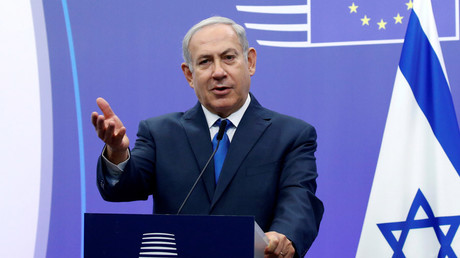Turkey plotting against Israel over Jerusalem might push Erdogan closer to Assad
Martin Jay is an award winning British journalist now based in Beirut who works on a freelance basis for a number of respected British newspapers as well as previously Al Jazeera and Deutsche Welle TV. Before Lebanon, he has worked in Africa and Europe for CNN, Euronews, CNBC, BBC, Sunday Times and Reuters. Follow him on Twitter @MartinRJay

The question a recent conference in Istanbul raises is not whether the Muslim world will support Palestine, but whether Erdogan’s stunt will succeed in breaking new ties between Israel and Arab countries aimed at getting a peace deal which pleases Netanyahu.
During a telephone interview I had with Steve Bannon in July 2016, just weeks before he was appointed Trump’s chief policy strategist in the White House, he asked me which country was the most dangerous in the Middle East region. He expected me to say Iran.
“Turkey,” I said. There was a pause on the line before he politely asked why. “Because Erdogan is a wild card who shifts his allegiances every five minutes and has so much to prove,” I replied.
Yet I could have equally applied the same argument toward Israel.
Benjamin Netanyahu is on the brink of being written into the history books as pulling off the Trump ‘success’ over the divisive Jerusalem capital debacle, but also facing graft charges which may well involve going to jail. He, like Erdogan – who is facing a tough presidential election campaign in 2019 that will make or break him – are both at pivotal points in their careers.
Turkey’s President Recep Erdogan moved so fast to organize an Organization of Islamic Cooperation (OIC) conference calling for East Jerusalem to be recognized as Palestine’s capital that you have to ask yourself if there was another agenda. Certainly in recent weeks, an ugly war of words has been going on between the two leaders with the most recent spat resulting in Netanyahu slamming Erdogan for the number of journalists in jail in Turkey, following the Turkish president’s attack on Israel’s treatment of Palestinians.
But we are being deceived. And the recent OIC conference held in Istanbul which rallied a number of Arab leaders to condemn Israel and America over Jerusalem lacks honesty. Indeed, Turkey’s patched up relations with Israel, after the fall out over the Israeli attack on the Turkish aid ship to Gaza in 2010, were always shaky. But the hot and cold relationship has now degenerated to one which, in my view, threatens to become one of almost military hostility between Turkey and Israel.
Hornets’ nest
The OIC conference did not achieve too much if we are to look at what is set out to do on the surface: stir up an anti-Israel movement among Arab countries to support the Palestinians. In fact, Turkey has probably stuck its arm into a hornet’s nest of regional woes which it might not have intended to antagonize – all in the name for making a bold statement to Israel.
As always, Turkey naturally vies to muster more power in the region as Erdogan sees himself as the president of a regional superpower, which balances its loyalties and influence between Russia on one side and the West and NATO on the other. Like Israel to some extent, Turkey sees itself as outgrowing the simplified East-West polarized model of geopolitics and considers the uniqueness of Ankara as a selling point to woo countries like Iraq, Iran, Lebanon, Qatar, Jordan and perhaps even Syria.
Turkey seeks its own sphere and herein lies the crux of the problem as Erdogan moves ahead with an anti-Israel policy – which will pay political dividends to him – while also being the grim reaper of the law of unintended consequences.
The Erdogan move threatens not only to push Turkey over a line and detach itself both from the Washington sphere of influence, but also break all relations with Israel – which might even create a thawing of relations between Ankara and Damascus and possibly even with Hezbollah in Lebanon, which sits on Israel’s border.
Lebanon’s President Michel Aoun attended the OIC conference and met with Erdogan later. Suddenly Lebanon looks like a country that Erdogan needs to boost relations with considerably.
It also makes the mythical threat of Iran, pushed by Riyadh harder to sell to Arab countries, even GCC states, when Tehran supports the notion that East Jerusalem should always be considered the capital of Palestine and if anyone is going to support – financially or militarily an ‘intifada’ against Israel – it will be Iran. Notably, leaders from the KSA, UAE and even Egypt didn’t show up in Istanbul.
What Erdogan really, really wants…
But the real prize for Erdogan is to threaten Israel’s economic and geopolitical advances with Arab countries which hate Turkey and would ideally like Erdogan to lose his power base, namely Saudi Arabia and the United Arab Emirates. The OIC conference and its demands place Gulf Arab states – and in particular Saudi Arabia – in a really awkward position with regards to their own relations with Israel which have been quietly developing quite nicely for a few years now, even before Trump took office. Saudi Arabia, the UAE, and Bahrain are all vying for an entirely new trading relationship with Israel which would benefit these Gulf states’ rickety, underinvested infrastructure.
The Trump administration’s boldest move is not the Jerusalem ruse, but installing its own acolyte in power in Saudi Arabia. The crown prince is not merely ambitious. I am told he is ready to do anything to take the Saudi throne when ultimately his father’s health wanes, a claim supported by journalist Jamal Elshayyal of Middle East Eye. And no one understands the move to threaten Israel’s (and America’s) hegemony in the region and the new relations it creates better than Netanyahu himself.
His quotes to the French president recently gave a coded warning to Erdogan. The Israeli PM cleverly mixed the Turkish president’s condemnation of him with the perceived threat of Iran – and this new group of countries coming closer to Israel, which is presumably vexing Erdogan.
According to Reuters, when asked about discontent across the region over Trump’s decision, including harsh criticism from Turkish President Erdogan, Netanyahu said many Arab nations were “increasingly aligned with Israel to tackle Iran’s regional threat.”
“Many Arab countries recognize that Israel is not their enemy but their indispensable ally,” he said.
“Countries in the region who do not have formal relations with us yet. Those can grow, but it doesn’t mean there will be a formal peace without some progress with the Palestinians.”
And so the OIC conference and its aims are not likely to achieve anything but represent an ideological clash with Netanyahu’s idea of a ‘peace plan’ which is linked to Gulf Arab countries first and foremost coming closer to Israel. Contrasted with Trump’s ideas that the peace process should be exclusive to the Israelis and not a regional matter involving other Arab countries, Netanyahu is intending to use Saudi Arabia and other countries as a leverage to get the deal they want with Palestine – and is fixated on the issue of state recognition as a deal breaker for moving forward. Palestinians will be forced to go along with these powerful Arab countries, he believes.
But not all countries follow this rationale and Turkey is championing a cause to fight head on the Israelis – which is likely to draw more support from Iran’s satellites in the region. No one in the Middle East believes that MbS in Riyadh or Sisi in Cairo actually genuinely condemn the Trump Jerusalem move. That is not the real question, as neither is whether Israel will lose anything by the OIC rhetoric, although some Gulf Arab states will fret over a new Arab Spring emerging in their own countries supporting the Palestinians, which is really what Erdogan hopes to impregnate with his colorful élan in front of the cameras.
The real question following the conference is what Steven Bannon should have asked me in July of 2016: “How far will Turkey go to enforce its own delusional hegemony on the region and in particular against Israel.” The answer still scares me to think about it today because the answer is “there is no limit.”
Martin Jay is based in Beirut and can be followed at @MartinRJay
The statements, views and opinions expressed in this column are solely those of the author and do not necessarily represent those of RT.




0 Comments:
Post a Comment
Subscribe to Post Comments [Atom]
<< Home